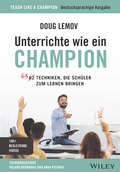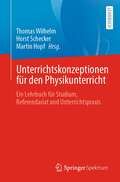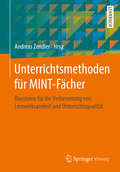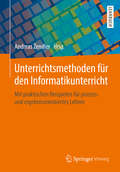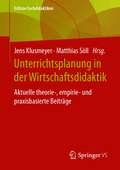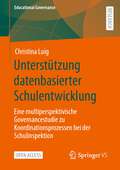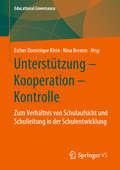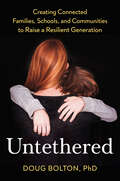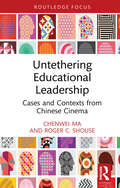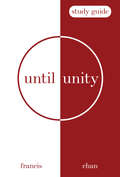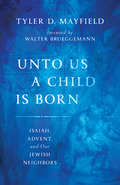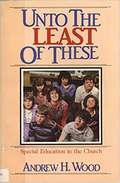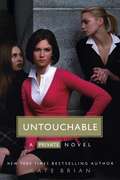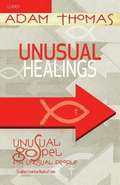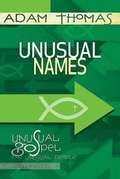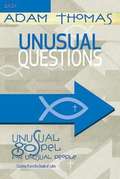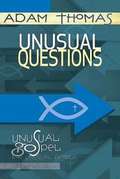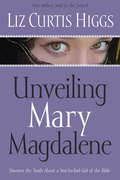- Table View
- List View
Unterrichte wie ein Champion: 63 Techniken, die Schüler zum Lernen bringen. Teach Like a Champion - Deutschsprachige Ausgabe (Für Dummies Ser.)
by Doug LemovIn vielen Klassenzimmern mangelt es am Engagement. Die Forschung zeigt, dass engagierte Schüler weitaus häufiger gute Schulnoten bekommen und weitaus häufiger hoffnungsvoll in die Zukunft blicken. Die besten Pädagogen bemühen sich daher, gut geführte Klassenzimmer zu schaffen, die das Engagement, das Vertrauen, den Respekt, die Verantwortlichkeit und die Konzentration der Schüler fördern. "Unterrichte wie ein Champion" vermittelt wirksame Lehrtechniken, die Lehrenden, vor allem denjenigen in den ersten Jahren, dabei helfen, wahre Champions im Klassenzimmer zu werden. Diese wirkungsvollen Techniken sind konkret, spezifisch und lassen sich leicht und direkt am nächsten Tag in die Tat umsetzen. Trainingsaktivitäten am Ende jedes Kapitels helfen dem Pädagogen, sein Verständnis durch Reflexion und Anwendung der Ideen auf seine eigene Praxis zu vertiefen. In einem "fruchtbaren Zyklus" wurden die Techniken in diesem Buch in fast zehn Jahren weltweit und regelmäßig verbessert. Begleitet wird das Buch durch einen Zugang zu über 100 Videos aus der Praxis, die die praktische Anwendung der Techniken zeigen.
Unterrichtenlernen und Forschenlernen: Eine empirische Studie über Forschendes Lernen in der Lehrkräftebildung
by Sabine LangEs kann von Wirkungszusammenhängen zwischen dem Lehramtsstudium und der Entwicklung professionellen Handelns ausgegangen werden. Zur Frage, wie professionelles Handeln während des Studiums gefördert werden kann, gibt es allerdings keine einheitliche Antwort beispielsweise das Curriculum oder hochschuldidaktische Ansätze betreffend. Ein hochschuldidaktischer Ansatz im Lehramtsstudium ist der des Forschenden Lernens. Hierbei soll sowohl das Erlernen von Unterrichten als auch das Erlernen von Forschen gefördert werden. Dieser doppelte Anspruch (Unterrichtenlernen und Forschenlernen) wird als sehr herausfordernd eingeschätzt, was sich ebenfalls in einigen empirischen Befunden widerspiegelt. Hieran knüpft diese Studie an, in dem die Perspektive Studierender in den Mittelpunkt gestellt wird und nach den subjektiven Theorien Studierender zu Unterrichtenlernen und zu Forschenlernen im Kontext Forschenden Lernens gefragt wird. Die Ergebnisse werden hinsichtlich konzeptioneller Ansprüche des hochschuldidaktischen Konzepts Forschenden Lernens diskutiert und es werden Anknüpfungspunkte für Wissenschaft und Praxis aufgezeigt.
Unterrichtskonzeptionen für den Physikunterricht: Ein Lehrbuch für Studium, Referendariat und Unterrichtspraxis
by Horst Schecker Thomas Wilhelm Martin HopfWelche Möglichkeiten habe ich für die Gestaltung des nächsten Themas meines Physikunterrichts? Diese Frage stellt sich Lehrkräften immer wieder. Dieses Lehrbuch hilft Lehramtsstudierenden, Referendaren und Lehrkräften dabei, Unterrichtskonzeptionen und ihre Leitideen besser zu verstehen und mögliche Alternativen für den eigenen Unterricht kennenzulernen. Die Autorinnen und Autoren stellen verschiedene Unterrichtskonzeptionen detailliert vor, die im deutschsprachigen Raum für den Physikunterricht entwickelt und in der Schulpraxis erprobt wurden. Zu allen Konzeptionen werden Quellen für Unterrichtsmaterialien angegeben. Die Kapitel beinhalten Übungen, die Leserinnen und Leser zum Durchdenken der Inhalte anregen.Im einführenden Kapitel des Werkes wird erläutert, in welchen Entwicklungszusammenhängen Unterrichtskonzeptionen entstehen. In vierzehn folgenden Themenkapiteln werden jeweils mehrere konkrete Unterrichtskonzeptionen mit ihren Leitideen und ihren Unterrichtsgängen vorgestellt. Die Inhaltsbereiche erstrecken sich vom Anfang der Sekundarstufe I bis hin zur gymnasialen Oberstufe. Dazu zählen u. a. die Optik, Mechanik, Wärmelehre, Elektrizitätslehre, Magnetismus, Felder, Quantenphysik, aber auch Nature of Science, fächerübergreifender Unterricht und prozessbezogene Kompetenzen.Die Leser und Leserinnen werden nach der Lektüre• Unterrichtskonzeptionen in wichtigen Gebieten der Schulphysik kennen,• wissen, was die jeweiligen Grundideen, Ziele und Elementarisierungen sind,• wissen, wo man Unterrichtsmaterialien zu den Unterrichtskonzeptionen findet,• die eigenen Vorstellungen, wie man ein Thema unterrichten sollte, durchdacht und überdacht haben.Leserinnen und Leser werden sich mit verschiedenen Zugängen, ein Thema zu unterrichten, beschäftigen und dadurch ihr Unterrichtsrepertoire erweitern können.
Unterrichtsmethoden für MINT-Fächer
by Andreas ZendlerMathematik, Informatik, Naturwissenschaften (Biologie, Chemie, Physik) und Technik - seit Jahren findet in der breiten Öffentlichkeit eine angeregte Diskussion über diese sogenannten MINT-Fächer statt. Denn das in den MINT-Fächern vermittelte Wissen ist die unverzichtbare Grundlage für die Ausbildung der in Deutschland dringend benötigten Fachkräfte. Darum fordern Politik und Wirtschaft eine stärkere Gewichtung der Fächer, aber auch eine Verbesserung der Unterrichtsqualität. Dieses Buch stellt 20 verschiedene, wissenschaftlich fundierte Methoden für den MINT-Unterricht vor und erläutert die Rolle der digitalen Medien als fächerübergreifendes Element. Die interdisziplinäre Betrachtungsweise bietet Lehrern einen umfassenden Überblick über die verschiedenen Möglichkeiten und Ansätze für den eigenen Unterricht. Für jede der vorgestellten Methoden geben die Autoren wissenschaftliche fundierte Einschätzungen zu ihrer Lerneffektivität und erleichtern so Lehrkräften die Auswahl der geeignetsten Methoden für den eigenen Unterricht. Detaillierte Unterrichtsmodelle helfen bei der Umsetzung in der Praxis. Damit erhalten Lehrer und Lehramtsstudenten einen umfassenden Einblick in die effektivsten Unterrichtsmodelle für ein prozess- und ergebnisorientiertes Lernen in den MINT-Fächern. Dieses Buch lässt sich ideal fächerübergreifend einsetzen und dient dazu, die Lerneffektivität speziell im MINT-Unterricht bei Schülerinnen und Schülern zu verbessern.
Unterrichtsmethoden für den Informatikunterricht
by Andreas ZendlerZu den meisten Unterrichtsfächern findet man heute umfangreiche Standardwerke zum Thema Unterrichtsmethoden, nur für das Fach Informatik existiert keine vergleichbare Literatur. Dabei zeigt ein Blick auf die Bildungspläne aller Bundesländer, dass sich die Informatik als Unterrichtsfach in den Sekundarstufen I und II etablieren wird. Das vorliegende Buch versteht sich als ein Beitrag zur Schließung dieser Lücke in der Informatikdidaktik. Unterrichtsmethoden sind für den Lernerfolg im Unterricht von entscheidender Bedeutung und bilden auch den Dreh- und Angelpunkt dieses Buches. Unterrichtsmethode wird verstanden als klar umrissener, begrifflich herauslösbarer, selbstständiger, wenn auch integrierter Bestandteil des Unterrichts. Als Beispiele für dieses Verständnis von Unterrichtsmethoden werden unter anderem die Vor- und Nachteile des problemorientierten Unterrichts, des entdeckenden Lernens, der Computersimulation, des Frontalunterrichts und der Modellmethode für die Informatikdidaktik erläutert. So entsteht ein Überblick über 20 verschiedene und für den Informatikunterricht relevante Methoden, die anhand von Vorgehensmodellen und konkreten Beispielen für den Einsatz im Unterricht illustriert werden. Außerdem haben Informatiklehrer die verschiedenen Methoden in Hinblick auf ihre Lerneffektivität eingeschätzt. Die Grundlage für dieses erste Übersichtswerk zu Unterrichtsmethoden für den Informatikunterricht bilden verschiedene Forschungsprojekte der Pädagogischen Hochschule Ludwigsburg, die zwischen 2015 und 2018 Daten zu diesem Thema gesammelt haben. Auch dieses wissenschaftliche Fundament macht das Buch zu einer unbedingten Empfehlung für alle (angehenden) Informatiklehrer, die schon lange nach einem Titel mit Unterrichtsmaterialien für den Informatikunterricht gesucht haben.
Unterrichtsplanung in der Wirtschaftsdidaktik: Aktuelle theorie-, empirie- und praxisbasierte Beiträge (Edition Fachdidaktiken)
by Jens Klusmeyer Matthias SöllDie Planung von Unterricht ist ein zentraler Gegenstand der Wirtschaftsdidaktik. Im Fokus der Disziplin stehen die Erarbeitung und Reflexion einschlägiger Forschungserkenntnisse sowie die Ableitung schlüssiger Entscheidungshilfen für die Akteurinnen und Akteure der Unterrichtspraxis. Auf Basis des aktuellen wirtschaftsdidaktischen Forschungsstandes zur Unterrichtsplanung eröffnen die Beiträge des Sammelbandes theorie-, empirie- und praxisbezogene Perspektiven. Die vorgestellten Forschungskonzepte, Modellierungen und Förderansätze zur Gestaltung wirtschaftsberuflicher Lehr-Lern-Arrangements wenden sich gleichermaßen an Wissenschaftlerinnen und Wissenschaftler sowie an Praktikerinnen und Praktiker.
Unterrichtszentrierte Schulentwicklung: Schulen auf dem Weg zu einer personalisierten Gestaltung von Lehr- und Lernprozessen
by Marco GalleIn diesem Open-Access-Buch untersucht Marco Galle, wie Lehrpersonen und Schulleitende ihren Unterricht und ihre Schule so weiterentwickeln können, dass sich die persönlichen Voraussetzungen und Ziele der Schülerinnen und Schüler verstärkt berücksichtigen lassen. Die Ergebnisse einer Längsschnittanalyse von Leitfadeninterviews aus zehn Schweizer Schulen, die personalisierte Lernkonzepte eingeführt haben, zeigen zahlreiche Entwicklungstätigkeiten auf Unterrichts- und Schulebene. So wird die Qualität der Lernaufgaben verbessert oder es werden individuelle Coachingangebote geschaffen. Mittels einer darauf aufbauenden transformativen Mixed-Methods-Datenanalyse werden pädagogisch-psychologische Unterrichtsmerkmale eruiert, die Hinweise darauf geben, warum solche Entwicklungsprozesse scheitern oder gelingen.
Unterstützung datenbasierter Schulentwicklung: Eine multiperspektivische Governancestudie zu Koordinationsprozessen bei der Schulinspektion (Educational Governance #58)
by Christina LuigIn diesem Open-Access-Buch werden mittels Experteninterviews aus verschiedenen Akteursperspektiven Koordinationsprozesse zwischen Schulleitung, Schulaufsicht, Schulinspektion und Schulentwicklungsberatung untersucht. Es ist ein seit Jahren robuster Befund, dass sich der Transfer von Ergebnissen der Schulinspektion in die Schulentwicklungspraxis nicht im erwarteten Maße erfüllt. In der Hoffnung auf nachhaltigere Effekte an Schulen gerät bei der Diskussion um Schulinspektion in Deutschland die Zusammenarbeit beteiligter Akteure zunehmend in den Fokus der Aufmerksamkeit. Christina Luig arbeitet anhand von Experteninterviews aus verschiedenen Akteursperspektiven Modi der Handlungskoordination heraus und identifiziert vorherrschende Handlungslogiken, die auf Steuerungsproblematiken und Rollenkonflikte im Akteurskonglomerat hinweisen. So lassen sich die Transferbedingungen von Inspektionsdaten in die Schulentwicklungspraxis besser verstehen und Überlegungen skizzieren, in welche Richtung sich Schulinspektion weiterdenken lassen sollte.
Unterstützung – Kooperation – Kontrolle: Zum Verhältnis von Schulaufsicht und Schulleitung in der Schulentwicklung (Educational Governance #48)
by Esther Dominique Klein Nina BremmDer Herausgeberband bietet einen Überblick zum Status Quo und jüngeren Entwicklungen der Zusammenarbeit von Schulleitungen und Schulaufsicht im Rahmen von Schulentwicklungsprozessen. Die Beiträge erörtern das Verhältnis zwischen Schulleitung und Schulaufsicht aus historischer, theoretischer und rechtlicher Perspektive, veranschaulichen es mit empirischen Befunden und eröffnen auf dieser Basis einerseits Entwicklungsperspektiven für die Praxis, zeigen andererseits aber auch Desiderata für Theorie und empirische Forschung auf.Der Inhalt• Rechtliche Perspektiven auf Schulaufsicht• Theorien und Bezugsdisziplinen• Erhöhte Eigenverantwortlichkeit von Schulen• Schulleitung und Schulaufsicht zwischen Kontrolle und Unterstützung• Kooperation und Beratung in Entwicklungsprozessen• Diskussion und Einordung aus bildungswissenschaftlicher und bildungsadministrativer PerspektiveDie HerausgeberinnenDr. Esther Dominique Klein ist akademische Rätin a.Z. an der Fakultät für Bildungswissenschaften der Universität Duisburg-Essen.Dr. Nina Bremm ist Professorin für Schulentwicklung in der Abteilung für Weiterbildung und Beratung an der Pädagogischen Hochschule Zürich.
Untethered: Creating Connected Families, Schools, and Communities to Raise a Resilient Generation
by Doug Bolton Ph.D.An essential guide to restoring our children&’s behavioral health and wellbeingOver the past decade, children&’s mental health challenges have reached epidemic levels—stress, anxiety, childhood depression, and suicide are at unprecedented high rates. Amid high-stakes pressure for kids to succeed, parents and teachers have never needed a road map to healthy child development more urgently. And as psychologist and educator Doug Bolton explains in this eye-opening and powerful guide, underlying our modern-day stresses is an even more pervasive problem: We&’re relying on practices that are not in line with what science tells us about how to truly motivate children and help them thrive.As Bolton persuasively argues, we need to step away from parenting and teaching based on controlling our children with incentives and punishments—they focus on short-term compliance at the cost of health development. Instead, creating healthy and strongly bonded communities for our children, both in our own families and in our schools, is key to their emotional well-being, and their success in life. Untethered offers tools to help us create these communities so our kids develop healthy attachments and learn emotional regulation, helping them feel more connected, less anxious, more included, less shamed, and more securely grounded. The power of communities is not only that they enhance our wellness—they buffer us from the impact of trauma and can be a guiding force in helping kids develop resilience.Weaving in Bolton&’s own experiences as a former principal at a therapeutic school and as a father, Untethered is a deeply empathetic and powerful guide to combating the isolation we see in this generation today, leading them toward a healthier, more interconnected future.
Untethering Educational Leadership: Cases and Contexts from Chinese Cinema
by Chenwei Ma Roger C. ShouseLingdao, the Chinese word for leadership, is rarely used to denote acts of social persuasion that occur outside of contexts of formal rank or status. However, the ubiquity of informal leadership in China raises a number of practical and theoretical questions. Based on an analysis of selected Chinese cinematic works depicting settings of educational practice and policy, the book explores how "Western" understandings of leadership emerge from these texts to form discursive media for social change. It also offers a new understanding of lingdao and leadership; how they represent a natural human desire, regardless of formal rank or position, to mobilize collective will, change minds, and achieve social change. The book will be of interest to professional scholars and graduate students of Chinese culture, educational leadership, mass media, and popular culture.
Until Unity
by Francis ChanIt is absolutely clear from Scripture that God passionately desires supernatural unity within His Church. Unity is what Jesus prays for, what He commands, and what He says will be our greatest witness to the world. If unity is so important to the heart of God, why is the Church one of the most divided groups on earth? In his newest book Until Unity, New York Times-bestselling author Francis Chan calls for believers and churches everywhere to align our hearts with God and start taking seriously His numerous commands to unify. While many believe doctrine is at the root of the problem, Francis argues that the real problem is the shallowness or non-existence of our love for each other—rooted in a shallowness in our understanding of the gospel. This is what desperately needs to change. The reason that God gifts the Church with leaders is so they can equip God&’s people in a way that leads to &“unity of the faith&” (Ephesians 4:13). We have done a poor job at this, but it can all change. Those who are believers will hear the call and be &“eager to maintain the unity of the Spirit in the bond of peace&” (v. 3). There will be opposition, but we cannot allow anything to discourage us from giving everything we have to the pursuit of a unified, restored Bride.
Until Unity: Study Guide
by Francis ChanChristians cannot remain indifferent to the divisions in the Church today. In this study guide companion, Chan draws on the gospel infused message of Until Unity to remind readers that Church unity is not optional. This study guide includes: Deeper exploration of every chapter in Until UnityFree original videos with Francis ChanTips for leading and participating in a small groupScripture passages and reflection questionsPrompts for group and individual prayer Chan&’s emphasis on worship and praise, along with his passionate teaching, make this guide a unique and life-changing exploration of why unity is not just God&’s wish for His Church—it&’s His command.
Untimely Meditations
by Friedrich NietzscheThe four short works in Untimely Meditations were published by Nietzsche between 1873 and 1876. They deal with such broad topics as the relationship between popular and genuine culture, strategies for cultural reform, the task of philosophy, the nature of education, and the relationship between art, science and life. They also include Nietzsche's earliest statement of his own understanding of human selfhood as a process of endlessly â becoming who one is'. As Daniel Breazeale shows in his introduction to this new edition of R. J. Hollingdale's translation of the essays, these four early texts are key documents for understanding the development of Nietzsche's thought and clearly anticipate many of the themes of his later writings. Nietzsche himself always cherished his Untimely Meditations and believed that they provide valuable evidence of his â becoming and self-overcoming' and constitute a â public pledge' concerning his own distinctive task as a philosopher.
Unto Us a Child Is Born: Isaiah, Advent, and Our Jewish Neighbors
by Tyler D. MayfieldWhether through a hymn, Handel&’s Messiah, or the lectionary reading, the book of Isaiah provides a familiar voice for congregations during the season of Advent. So how do we create faithful, Christian interpretations of Isaiah for today while respecting the interpretations of our Jewish neighbors? Integrating biblical scholarship with pastoral concern, Tyler Mayfield invites readers to view Isaiah through two lenses. He demonstrates using near vision to see how the Christian liturgical season of Advent shapes readings of Isaiah and using far vision to clarify our relationship to Jews and Judaism—showing along the way how near vision and far vision are both required to read Isaiah clearly and responsibly.
Unto the Least of These: Special Education in the Church
by Laverne Webber Ellen Glanville Andrew WoodDescribes how to develop a ministry for the mentally retarded. Includes teaching strategies, discipline information, and other useful information.
Untouchable (Private Series #3)
by Kate Brian Julian PeploeCheating, partying, blackmail, and now...murder? Can the Billings Girls remain untouchable? Reed's boyfriend, Thomas Pearson -- the popular, easygoing, irresistibly handsome and charismatic boy she fell in love with -- is dead. No one knows how it happened, and everyone is after the truth. Or are they? Life at Easton Academy begins to feel very different. Taylor is acting like the poster child for Prozac, Kiran is spiking her cornflakes, Noelle is being kind of...nice, and Arianna keeps floating along as if nothing has happened. Thanksgiving break arrives and Reed and Josh find themselves alone on campus. They are forced to confront the feelings they've been hiding. Those feelings combined with an empty campus result in the hottest hookup Reed could possibly imagine. But when Reed breaks the news about Josh to the Billings Girls, there's no fun game of tell-all. Instead, Josh begins to look like suspect No. 1 in the murder of Thomas Pearson. The perfect life Reed has constructed as a Billings Girl begins to crumble. And as everyone becomes more convinced of Josh's guilt, Reed's private suspicions lead her somewhere she doesn't want to go.
Unusual Healings Leader Guide
by Adam ThomasIn the Gospel According to John, Jesus never says, "Your faith has made you well." He heals no fewer than five people over the course of the Gospel. How can this be? And how do the healings speak to the lives of contemporary Christians? During the sessions of this module, Unusual Healings, we will learn that responding to Jesus' call in our lives and discovering a personal identity based on his divine identity naturally lead to healing, new life, and mission. Each session begins with an opening prayer, followed by the text of the day being read aloud. The group will enjoy a 5-7-minute video where Adam shares his thought on the Scripture and its "unusual" focus. The group will discuss the readings for the day then close with prayer. The new and exciting aspect of this particular Bible study series is the blending of traditional weekly Sunday school with modern, daily-delivered digital content, which will keep readers connected with the material throughout the week. Between the daily communication and the group gatherings, participants will immerse themselves in the Good News. The emails that accompany this study are crucial to the small-group experience and leaders should notify small-group members to subscribe for their emails at least 1-2 days in advance of the first gathering.
Unusual Healings Personal Reflection Guide
by Adam ThomasIn the Gospel According to John, Jesus never tells people that they are healed. He never says, "Your faith has made you well." He never spits on the ground to make mud nor lays his hands on anyone nor notices anyone laying hands on him. And yet, he heals no fewer than five people over the course of the Gospel. How can this be? How can Jesus heal people without speaking a word of healing or letting them know that they are healed? And how do the healings speak to the lives of contemporary Christians? Each session opens begins with an opening prayer, followed by the text of the day being read aloud. The group will enjoy a 5-7 minute video where Adam shares his thought on the Scripture and its "unusual" focus. The group will spend time discussing focus and the session will close with prayer. The new and exciting aspect of this particular Bible study series is the blending of traditional weekly Sunday school with modern, daily-delivered digital content, which will keep readers connected with the material throughout the week. Between the daily communication and the group gatherings, participants will immerse themselves in the Good News. This book will help participants reflect on ideas encountered in DVD, daily emails and during group discussion in order to nurture their relationship with God and growth in faith.
Unusual Names Leader Guide
by Adam ThomasThe first two times Jesus says "I am," no predicate nominative follows. Remember seventh-grade English class: a predicative nominative is a noun that follows a linking verb. The first time, he says "I Am-the one who speaks with you" to the woman at the well. The second time, he says "I Am. Don't be afraid" to the disciples. In both cases the words stands alone: I AM. These statements are declarations of God's very being, and they appear several more times over the course of the Gospel. A broader statement cannot be made. "I AM" is as close as language can get to universality and eternity. One of the markers of this revelation is a second kind of "I am" statement. This second kind takes a piece of the great "I AM" and fills in the blank that our sense of curiosity wills to be there. When Jesus says, "I am the bread/light/shepherd/vine/___," he is comparing himself to those things. In these "I am ________" statements, Jesus discloses a piece of his divine identity, enough for us to hear, swallow, and digest over the course of a lifetime. Each session begins with an opening prayer, followed by the text of the day being read aloud. The group will enjoy a 5-7-minute video where Adam shares his thought on the Scripture and its "unusual" focus. The group will discuss the readings for the day then close with prayer. The new and exciting aspect of this particular Bible study series is the blending of traditional weekly Sunday school with modern, daily-delivered digital content, which will keep readers connected with the material throughout the week. Between the daily communication and the group gatherings, participants will immerse themselves in the Good News. The emails that accompany this study are crucial to the small-group experience and leaders should notify small-group members to subscribe for their emails at least 1-2 days in advance of the first gathering.
Unusual Names Personal Reflection Guide
by Adam ThomasThe first two times Jesus says "I am," no predicate nominative follows. Remember seventh-grade English class: a predicative nominative is a noun that follows a linking verb. The first time, he says "I Am-the one who speaks with you" to the woman at the well. The second time, he says "I Am. Don't be afraid" to the disciples. In both cases the words stands alone: I AM. These statements are declarations of God's very being, and they appear several more times over the course of the Gospel. A broader statement cannot be made. "I AM" is as close as language can get to universality and eternity. One of the markers of this revelation is a second kind of "I am" statement. This second kind takes a piece of the great "I AM" and fills in the blank that our sense of curiosity wills to be there. When Jesus says, "I am the bread/light/shepherd/vine/___," he is comparing himself to those things. In these "I am ________" statements, Jesus discloses a piece of his divine identity, enough for us to hear, swallow, and digest over the course of a lifetime. Each session begins with an opening prayer, followed by the text of the day being read aloud. The group will enjoy a 5-7-minute video where Adam shares his thought on the Scripture and its "unusual" focus. The group will discuss the readings for the day then close with prayer. The new and exciting aspect of this particular Bible study series is the blending of traditional weekly Sunday school with modern, daily-delivered digital content, which will keep readers connected with the material throughout the week. Between the daily communication and the group gatherings, participants will immerse themselves in the Good News.
Unusual Questions Leader Guide
by Adam ThomasIn the Gospel According to John, people ask Jesus some unusual questions. Much of the first half of the gospel is structured around Jesus conversing with individuals or groups of people. Their questions, along with their discussions with Jesus surrounding the questions, make up the jumping off point for this study. Their questions help us explore what it means to ask our own. Each session begins with an opening prayer, followed by the text of the day being read aloud. The group will enjoy a 5-7-minute video where Adam shares his thought on the Scripture and its "unusual" focus. The group will discuss the readings for the day then close with prayer. The new and exciting aspect of this particular Bible study series is the blending of traditional weekly Sunday school with modern, daily-delivered digital content, which will keep readers connected with the material throughout the week. Between the daily communication and the group gatherings, participants will immerse themselves in the Good News. The emails that accompany this study are crucial to the small-group experience and leaders should notify small-group members to subscribe for their emails at least 1-2 days in advance of the first gathering.
Unusual Questions Personal Reflection Guide
by Adam ThomasIn the Gospel According to John, people ask Jesus some unusual questions. Much of the first half of the gospel is structured around Jesus conversing with individuals or groups of people. Their questions, along with their discussions with Jesus surrounding the questions, make up the jumping off point for this study. Their questions help us explore what it means to ask our own. Each session begins with an opening prayer, followed by the text of the day being read aloud. The group will enjoy a 5-7-minute video where Adam shares his thought on the Scripture and its "unusual" focus. The group will discuss the readings for the day then close with prayer. The new and exciting aspect of this particular Bible study series is the blending of traditional weekly Sunday school with modern, daily-delivered digital content, which will keep readers connected with the material throughout the week. Between the daily communication and the group gatherings, participants will immerse themselves in the Good News.
Unveiling Mary Magdalene
by Liz Curtis HiggsWhether readers have already enjoyedUnveiling Mary Magdaleneor are about to dive in for the first time–individually or in a group setting–this 6-week companion workbook provides a practical, meaningful resource for spiritual growth and a deeper understanding of God’s Word. The questions at the end of each chapter ofUnveiling Mary Magdaleneare included–and expanded–in theUnveiling Mary Magdalene Workbook,with more in-depth biblical material and plenty of space for jotting down individual answers and observations. Sized to match the original book, theUnveiling Mary Magdalene Workbookenhances the message of Liz Curtis Higgs’s third book in theBad Girlsseries, a best-selling combination of solid Bible teaching and Liz’s unique style of “girlfriend theology. ”
Unveiling Mysteries of the Bible
by Grant R. JeffreyThe Bible is certainly the most mysterious book ever created. The Scriptures are filled with hundreds of curious passages that have puzzled both Jews and Christians for thousands of years. In this powerful, faith-building book, respected author Grant R. Jeffrey takes the reader on a journey of mystery while uncovering deep truths found in the word of God. "It is the glory of God to conceal a thing:But the honour of Kings is to search out a matter."Proverbs 25:2Key Topics Include:·The Mystery of "3 Days and 3 Nights" and Christ's Resurrection·The Mystery of the Virgin Birth and the Star of Bethlehem·The Fall of the Walls of Jericho·Ancient Egyptian manuscript confirms the 10 plagues of Exodus·Joshua's Long Day·Jonah and the Great Fish·The Mystery of the Lost Treasures of the Temple·Why Christians Worship on SundayFrom the Trade Paperback edition.
